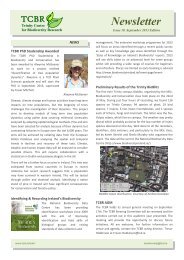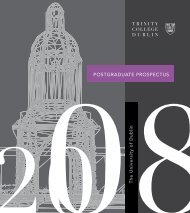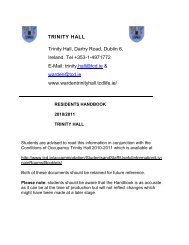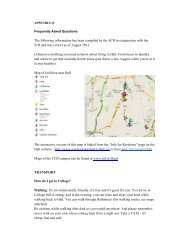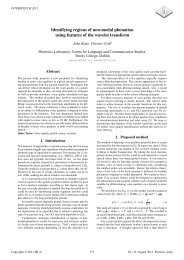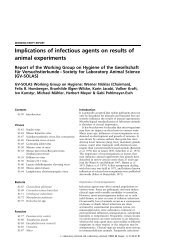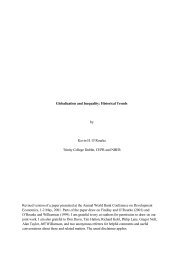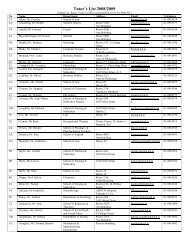Conference Programme (PDF, 1019KB) - Trinity College Dublin
Conference Programme (PDF, 1019KB) - Trinity College Dublin
Conference Programme (PDF, 1019KB) - Trinity College Dublin
You also want an ePaper? Increase the reach of your titles
YUMPU automatically turns print PDFs into web optimized ePapers that Google loves.
abstracts by stream and session<br />
We will start with a straightforward analysis of differences in attitudes towards migration between native respondents and those<br />
with migratory background. And will compare these differences across European societies while controlling for standard individual<br />
characteristics.<br />
In the second step, we will compare various aspects of these attitudes between three groups, namely native population, first- and<br />
second-generation immigrants. While the main focus on attitudes remains unchanged, we are interested in exploring whether there are<br />
some tendencies towards the acculturation, i.e. the second-generation migrants hold views which are more similar to those of the native<br />
population, rather than first-generation.<br />
Unfortunately, the data limitations do not allow us analysing the attitudes which would be expressed differently towards a particular<br />
ethnic-origin group, rather than towards an entire migrant population, or towards their own group, nor the expression of views of<br />
migrants towards the host societies. Nonetheless, our work is an important contribution to the discussion of this under-investigated area<br />
in migration research.<br />
Short-Term Training Programs for Immigrants: Do Effects Differ from Natives and Why?<br />
Alisher Aldashev, Kazakh-British Technical University of Almaty, Kazakhstan<br />
Stephan L Thomsen, University of Magdeburg, Germany<br />
*Thomas Walter, ZEW Centre for European Economic Research, Germany<br />
We evaluate the effects of different short-term training programs on the employment chances of immigrant and native welfare recipients<br />
in Germany. In particular, we investigate whether program effects differ between both groups and what might cause these potential<br />
differences. To answer these questions we estimate separate models for immigrants and natives using propensity score matching<br />
estimators in a first step. In a second step to provide an explanation of the differences in effects, we suggest a decomposition method<br />
based on the matching procedure that allows identification of differences due to observable characteristics and differences related to an<br />
immigrant fixed effect.<br />
integration<br />
Session 1h East European and Return Migration<br />
The state, media, and racialisation of Hungarian and Romanian migration to the UK<br />
*Jon Fox, University of Bristol, UK<br />
Laura Morosanu, University of Bristol, UK<br />
Eszter Szilassy, University of Bristol, UK<br />
In 2004, the UK opened its doors to migrants from the EU’s newest member states – 8 East European countries, and Cyprus and Malta.<br />
Earlier predictions of about 10,000 workers arriving were quickly eclipsed; to date about 1.5 million migrants from Eastern Europe,<br />
including a smaller fraction of workers from Romania and Bulgaria (which joined the EU in 2007) have come to the UK. In many respects<br />
these newest migrants to the UK resemble past migrants to the UK: they left poorer parts of the world in search of work and better life in<br />
the UK. But in other respects, they look different: they’re white. The link between racism and migration is well-documented. But what<br />
happens when migrant and host are supposedly the same ‘race’? Does nominally shared whiteness between migrant and host exempt<br />
this current cohort of East Europeans from the types of racism that have plagued previous waves of migrants to the UK? This paper<br />
addresses such questions, by looking at the case of Hungarian and Romanian migrants in the UK.<br />
These recent migrations have already been the focus of sustained scholarly investigation. The whiteness of the migrants, however, has<br />
meant that ‘race’ has not typically figured as a part of that analysis. Yet the history of migration to the UK and elsewhere suggests that<br />
shared ‘whiteness’ has provided earlier cohorts of migrants with little insurance against racism. Evidence from the current migrations<br />
would seem to indicate that history is repeating itself. The purpose of this paper is thus to explore the role of ‘race’ and racism in this<br />
current and ongoing East European migration to the UK. Toward this end, we consider the role of the state and the media in proffering,<br />
transmitting, and legitimating racialised understandings of migration and the migrants that people them. The state and media have long<br />
been recognised as important institutions responsible for supplying and disseminating racial and racialised frames of interpretation for<br />
making sense of migration. Our case will demonstrate that the absence of ‘racial’ difference doesn’t get in the way of xenophobia and<br />
racism; it turns out racial difference can be invented in vitro.<br />
Our investigation will focus on two cohorts of East Europeans from these recent migrations: Hungarians and Romanians. Hungarians<br />
began coming with the first and much larger wave of migrants in 2004; their entry into and subsequent mobility in the labour market is<br />
mostly unregulated. Romanians started coming in 2007 when Romania and Bulgaria joined the EU; they are much fewer in number and<br />
their labour market access is highly regulated. We are interested in whether and how these differences account for differences in the<br />
ways in which (and degrees to which) these two cohorts of migrants are racialised. Our examination proceeds in two parts. In the first part<br />
of the paper, we consider how questions of ‘race’ get implicated in British immigration policy concerning these migrants. We argue that<br />
94



